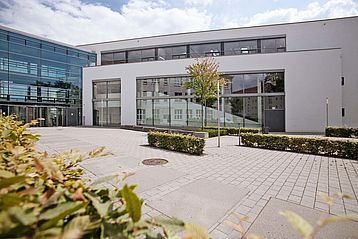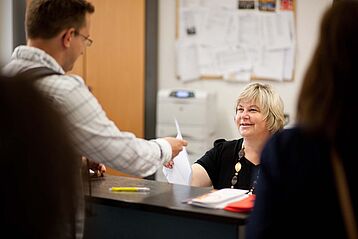![[Translate to Englisch:] [Translate to Englisch:]](/fileadmin/Dokumente/_processed_/b/e/csm_Soziale_Arbeit_13a661262a.png)
Master’s in International Social Work
Become an expert on global challenges!
Globalization not only has an impact on people around the world, but also on the profession of social work. By focusing on the substantive growth fields of human rights and educational work, as well as engagement in civil society and the promotion of democracy at an international level, the Master's in International Social Work will equip you to identify and deal with global challenges.
Are you interested in working with us across borders to develop a narrative for international social work?
Key topics in the Master's in International Social Work
The program “International Social Work” comprises four regular semesters, leading to the Master of Arts degree, which entitles graduates to pursue doctoral studies.
The main areas of focus are:
- international comparisons of approaches to social problems and how they are handled
- political and professional parameters and approaches of international social work
- human rights work, educational outreach and promotion of engagement in civil society at an international level
- specialist English language skills
- European and international funding policy structures
- basics of project management in social work, including the content, staffing and financial development of the project through to the proposal and implementation stage
Well-prepared for new challenges to the social work profession
In the face of globalization and greater reflectiveness in social work, it is becoming increasingly important for both the discipline and the profession to take global responsibility and become active in cross-border interdependencies beyond nation-states. As a reflexive form of social support and empowerment for people growing up and leading their everyday lives in very different circumstances, social work has developed into a field in which nation-state boundaries are augmented or even supplanted by cross-border contexts, both in terms of socio-political challenges and in the development of transnational services and provider structures. The merging of local, national and global approaches is increasingly becoming a basic prerequisite for any sustainable social work practice.
It is precisely this fusion of the local and the global in sustainable social work that is the central starting point of this transnationally-oriented degree program. Its unique feature is its didactic combination of theoretical analytical skills and practical action orientation. Not only does this make international social work accessible, but it also enables students to use their judgement to develop the ability to operate effectively in the field.
Overview
- Title Master International Social Work
- Qualification/degree Master (Master of Arts)
- Duration 4 semesters
- Mode of study full-time
-
Flexibility
Open for occasional students
Part-time studies possible
Open to affiliate students
-
Beginning
Winter semester
- Costs -
- Period for enrolment 01.05. - 31.05.
- General Requirements Yes Show
- Special Requirements No
- International application Show
Master’s in International Social Work: Program Structure
This four-semester degree program focuses on analytical approaches (1st semester), action theory approaches to international social work (2nd semester) and the teaching of knowledge and skills in practical work and research (1st - 4th semester).
The main didactic goal of the degree program is to prepare (in the 1st and 2nd semesters) and complete (in the 3rd semester) a 15-week work placement abroad, which is supervised by our teaching staff.
These practical components are complemented by a research-oriented thesis, embedded in the international discourse with global practitioners and network partners during our annual International Social Work Days.
Program Highlights
- preparation and implementation of a 15-week work placement abroad,
- development of a small international research project,
- active participation in the annual International Social Work Days at the University of Applied Sciences Erfurt; meeting students and researchers from our partner universities around the world.
Fields of work for your practical semester abroad
For your international work placement, you can choose any field of social work and any country.
Here are some examples of previous student placements:
- working with women in India
- human rights work in Belgium
- international development cooperation in Spain
- peace work in Colombia
Important Documents
Master’s in International Social Work: Your Background
Find out here what you need to bear in mind when applying for the Master's in International Social Work!
Entry requirements
As a general admission requirement for the Master's program, students must hold an undergraduate degree from a university or cooperative education institution with a minimum of 180 credit points and an overall grade of at least 2.5 in one of the following subjects:
- Social Work
- Pedagogy
- Educational Sciences
The majority of lectures on this degree program are taught in German, meaning that applicants must be proficient in German (C1 level or higher) upon starting the course.
All applicants must also provide proof of sufficient English skills at B2 level according to the Common European Framework of Reference for Languages (CEFR) or UniCert III.
Selection procedure
To be admitted to the Master's program, you need a total score of 75 out of a possible 100 points. The following criteria are taken into account when awarding points:
Scale:
- 1.0 - 1.1 60 points
- 1.2 - 1.3 55 points
- 1.4 - 1.5 50 points
- 1.6 - 1.7 45 points
- 1.8 - 2.2 40 points
- 2.3 - 2.5 35 points
If you do not have your undergraduate degree by the end of the application period but can prove that you have earned at least 150 credit points, your points will be awarded on the basis of the average grade of the weighted mean value of the module grades received. In this case, your admission is subject to proof that you have successfully graduated with your university degree.
An online, subject-related introductory interview is the opportunity for the applicant to demonstrate that they have the necessary qualifications for the Master's program. This interview counts for 40% of the points (maximum 40 points) towards the overall score. We would like to get to know you better and talk to you about whether your skillset and expectations of a Master's degree in International Social Work correspond to what we (can) offer.
The aim of the interview is to
• find out more about your motivation for the degree program,
• discuss our mutual expectations with regard to this exciting degree course, and
• talk about your next steps so that you are well prepared to start the Master's.
Multiple opportunities after graduation
With this degree, you will have excellent prospects for working in social work organizations outside of Germany or for a German or international organization operating abroad. With their expertise, our graduates are also in demand as specialists who can deal with international challenges in social work in Germany. Typical fields of employment for our graduates at home and abroad tend to involve working with refugees, women, the LGBTQ community, people experiencing conflict, or children and young people in educational and counselling settings. New opportunities are also emerging in the fields of social agriculture and sustainable social work.
With a Master’s degree, you can also pursue doctoral studies. This is something that several graduates have already benefited from in our faculty's "Thuringian Institute for Early Childhood Education at the University of Applied Sciences Erfurt" (ThInKPäd) and the affiliated "Institute for Municipal Planning and Development" (IKPE).



























